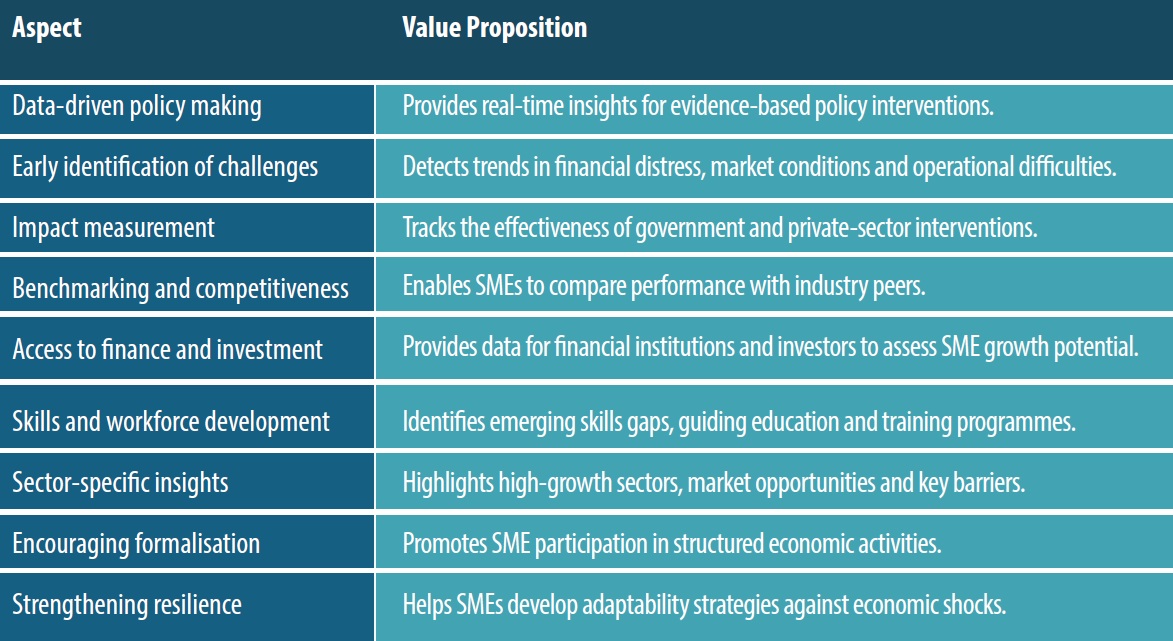a The new index, which serves as a measure for the growth and development of small and medium-sized South African enterprises, was launched by the Absa Bank's SME Business Unit, the South African Chamber of Commerce (SACCI), and the Market Research Bureau (BMR) as its research partner.
BMR here outlines how the index is based on regular research and provides a detailed assessment of what SBGI wants to achieve in the context of the South African SME landscape.
South Africa's small, medium and microenterprise (SMME) sector is a key driver of economic activity, employment and innovation. Of the estimated 2.67 million SMMEs in South Africa, about a third have officially undergone surgery, while two thirds are informal. Collectively, the sector provides an estimated 101.4 million jobs, with SMEs (small and medium-sized businesses) making up 91% of formal businesses, roughly 60% of employment and around 34% of domestic GDP.
Despite its important role in the economy, SMMES faces enduring challenges that hinder growth and sustainability. The Small Business Growth Index (SBGI) is designed to provide a comprehensive understanding of the SME landscape (up to 50 employees), providing data-driven insights to inform policy interventions, improve business strategies, and enhance SME Resilience.
Key parties involved in the SBGI initiative include Absa Bank's Small Business Business Unit, the South African Chamber of Commerce (SACCI), and the Market Research Bureau as a research partner.
Key trends in the SME sector
The number of SMEs and financial performance within the SME sector continues to decline. The number of new SMEs remains low, with nearly a quarter of SMEs operating within three years. The profitability of small and medium-sized businesses has dropped dramatically, indicating systematic challenges affecting the sustainability of SME businesses. The higher failure rates than elsewhere in the world are other failure rates around the world, with 70% to 80% of South African small and medium-sized businesses breaking down within the first five years.
These trends highlight the need for a structured approach to help small and medium-sized businesses in overcoming both external challenges (extrinsic factors) and internal weaknesses (endogenous factors).
External issues affecting small and medium-sized enterprises (exogenous factors)
Exogenous factors refer to external conditions that affect the growth of small and medium-sized enterprises, including economic, regulatory and infrastructure constraints. Addressing these challenges requires coordinated efforts from stakeholders in government, financial institutions and industry.
How SBGI deals with exogenous challenges
SBGI provides key insights to policy makers, financial institutions and industry stakeholders and develop targeted solutions to address external challenges. By leveraging data from the SME performance indicators, the SBGI is:
Notifies economic policies that support small and medium-sized enterprise-friendly fiscal measures. Identify financial accessibility gaps and ensure that funding initiatives are directed effectively. It highlights regulatory constraints and enables streamlined business registration and compliance. It provides sector-specific insights into infrastructure needs and advocates for better resource allocation. It monitors small and medium-sized enterprise participation in domestic and export markets to promote equal arenas. Provide real-time data to measure the impact of anti-corruption and security initiatives on business operations.
Internal weaknesses (endogenous factors) affecting small and medium-sized enterprises
Endogenous factors are related to the inefficiency of internal institutions within SMEs, including inadequate skills, poor financial management, and limited strategic orientation. Addressing these gaps requires business development programs, mentorship and capacity building initiatives.
How SBGI deals with endogenous challenges
SBGI can serve as a valuable benchmark tool for small and medium-sized businesses, helping to identify areas of debilitating and guide targeted interventions. By analyzing performance data for small and medium-sized businesses, the SBGI is:
Identify entrepreneurs' training and skill development needs. Identify cash flow management issues and lead to better financial literacy programs. We guide small and medium-sized businesses to improve their business strategies as industry trends. It supports the adoption of technology by measuring the progress of digital conversion. It provides relatively insight and helps small businesses improve their customer retention strategies. Explore and benchmark opportunities to increase market access.
The strategic role of SBGI in small and medium-sized enterprise development
In addition to addressing specific challenges, SBGI plays a crucial role in shaping the effectiveness environment for SME growth. SBGI value propositions are included in this table.

Conclusion
The SME sector remains the basis of South Africa's economy, but faces challenges that threaten its growth and sustainability. The Small Business Growth Index (SBGI) is an important business intelligence tool that ensures targeted interventions, enhanced policy development, and increased resilience for small and medium-sized businesses. By leveraging regular self-management research, the index promotes collaboration with small and medium-sized businesses, policymakers, financial institutions and industry leaders.
The Small Business Growth Index (SBGI) is an important business intelligence tool that ensures targeted interventions, enhanced policy development, and increased resilience for small and medium-sized businesses.
The first SBGI survey will be distributed to small businesses for completion in April 2025 in all nine South African states. This provides SMEs with the opportunity to share insights into the growth and development challenges they face in their regions, sizes and sectors. The SBGI initiative also provides small businesses with the opportunity to register as ambassadors for small businesses. Small businesses will also be given the opportunity to participate in planned future government lobbying events.
SBGI was repeated in September 2025 to track changes in South Africa's dynamic small business ecosystem. The aftermath of two SBGI surveys in 2025 will be named after the SBGI ambassadors of the year. The overall intention of SBGI innovation is to use small business intelligence attributed to SBGI research to influence small business growth and development policies, achieving the full potential of this important sector of the South African economy.
Contact details: Market Research Bureau
Key SBGI representatives: Professor DH Tustin, Professor CJ Van Aard, Professor PK Kibuuka Email: deon.tustin@bmr.co.za Website: https://bmr.co.za/

